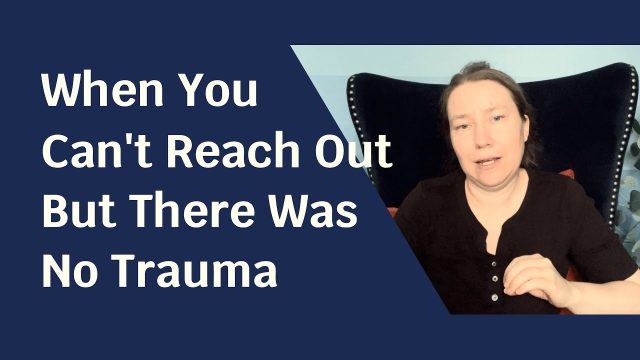
Struggling to reach out?
Here’s a pattern that I see with quite a few of my clients, and I’m wondering if this might be true for you. I’m thinking of someone who wants friends, and tries to reach out to text someone, to message them, but questions whether this would be a good time or whether they would be interrupting, or if the other person really wants to hear from them again. Questioning after you had a good conversation, whether that was real or whether they ever wanted to hear from you again.
Here’s the thing, those thoughts that cause us pain can feel so true but they’re usually not.
If you contact them, would they be upset by it or just not care? Would you be getting in the way if you went out for drinks with people after a get-together? Maybe you think about messaging someone on Slack about a common interest and you wonder if you’re going to come across as weird, clingy, or inappropriate? If you’re contacting them too much, even though it’s only been once, twice or perhaps never? You question so much that you end up not doing it at all. You don’t reach out, or very rarely, and you still feel like it’s too much.
Often, underneath that, there’s a painful thought that’s going on. Sometimes it’s “I’m not quite interesting” or “I’m not unique”, or “they really wouldn’t want to spend time with me.” When you can’t locate a specific reason for those thoughts to develop, like there wasn’t a specific trauma or you didn’t grow up in an abusive household, sometimes it can feel like you don’t have a good reason for it. And therefore we’re not allowed to feel those things, but they always come from somewhere.
Here’s the thing, those thoughts that cause us pain can feel so true but they’re usually not. When we believe them they cause the things that we complain about most in our lives. Like, “Why can’t I reach out to people?”, “Why can’t I make friends?”, or “Why can’t I just send this frickin’ email?” But there was always a reason why those thoughts started. It was usually beneficial to us at that time.
The potential reason
Maybe socializing was just damn confusing, and by not engaging as much you avoided having to deal with all of those genuinely complicated social interactions that you didn’t know how to navigate and you didn’t have a guide to help you with at the time.
For example, you see other people doing this and you kind of figure out what the social expectation is, but it’s not all the time and there’s this other situation… but under these circumstances…? It goes this way, or in this situation it plays out like this… and here’s another exception… “which one’s the right answer? I don’t know.”
It’s been a long time, you’ve learned a lot more about how to interact with people, you’re a lot better at it.
I get that so much.
So by staying in this questioning loop, that doubting, you managed to avoid all of that. All of the negative reactions, the embarrassment, the thoughts that, “Oh, they really wouldn’t want to talk to me anyway. I’m not that interesting. I’m not unique, so they wouldn’t want to hear from me.” And then you don’t have to engage in those things that cause confusion, overwhelm and lead to the missteps, getting laughed at, embarrassment, and all that stuff that sucks.
So, those thoughts can be useful at the time, but they don’t apply anymore. It’s been a long time, you’ve learned a lot more about how to interact with people, you’re a lot better at it. You’re also better at dealing with discomfort, and with how to deal with missteps in social interactions.
It’s those painful thoughts that if we work with them, and can defuse those thoughts themselves, we find they’re not actually true anymore (maybe they were never true, but they were helpful for a while), reducing at least the intensity of it. Maybe even making the thoughts over time fade away. That can make an enormous difference in how you’re able to socialize at this point and going forward, because it reduces the stress, it reduces the doubt, and it reduces the pain.
It’s those painful thoughts that if we work with them, and can defuse those thoughts themselves, we find they’re not actually true anymore…
So your brain is able to come up with other options, to be able to entertain other ideas, “Maybe, at the time, I didn’t have the support that I needed to understand this. But I’ve gotten a lot better at understanding people and I can try it out. I could reach out to this person that I’ve been thinking about reaching out to. If it goes great, then awesome! If it doesn’t go so well, then I know how to handle that.”, or “Maybe there’ll be someone else, maybe a different situation, or maybe I could come up with a different way to phrase things that would come across as less clingy but still open anyway?” It opens up new possibilities is all I’m trying to say here.
I am wondering if this brought up anything for you, if this feels familiar? I hope you have a neurowonderful day.




